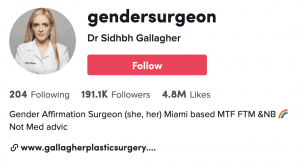Yes, at some point I’m going to run out idiotic “-day” related headlines, but until then you are stuck, friends.
And yes, I know I need to get this posted pronto, or else I’ll have to find a new song title to mangle.
Today, a bit of a mix. We’ll start with this, taken from Glinner – one note, amid a list of incidents that are actually dangerous to women and girls. But we’ll stick with this one:
Robin Moria White has been nominated in the ‘leader of the year’ category of the Women Influence and Power in Law UK Awards.
The 58-year-old barrister was called to the Bar in 1995 but only transitioned 11 years ago at the age of 47. He denies enjoying any ‘privilege’.
If you pay attention to these things, you see more and more males being “honored” for their achievements as “women.” No, the numbers aren’t huge, but just remember – for every man’s nomination to a “woman of the year” honor – that’s one deserving actual woman left off the list.
All right, let’s get to the more disturbing material.
As I’ve said many times, there is really no such identity as “trans.” It’s a term that covers various unfortunately and tragic illnesses, dysphorias and stupid fetishes.
As Abigail Shrier detailed in her book Irreversible Damage and countless others have and are currently documenting, one of the most disturbing aspects of the “trans” moment is the phenomenon of adolescent girls and young women transing right out of womanhood. I’ve written about this in a few places, including here.

One would think that feminists would be on high alert, up in arms and charging into battle over a culture in which young women are, in not huge, but steadily increasing numbers, noping out of womanhood, having fundraisers to have their breasts amputated, finding peace in being called one of the “guys,” and seriously contemplating surgery to get a fake penis.
One would think. One would think this would be a moment to stop and consider what we are saying to young women about womanhood, the messages we are sending about sexuality and value of the self, and, just as damningly, what decades – decades– of purported feminism has contributed to women’s lives, well being and yes – self-acceptance.
But no, we’re just determined to be good allies.
Anyway, a couple of pieces for you.
First, a long blog post from Lily Maynard on Miami-based, Irish plastic surgeon Sidhbh Gallagher. If you’re at all interested/concerned about these issues, this will be valuable. Warning, though – it’s disturbing, especially if this is all new to you.
Gallagher is a fairly young (under 40) surgeon who specializes in “gender-affirming” surgery (more on that notion from me here.) She has a strong following on TikTok, where she’s famous for celebrating how she “yeets the teets.” She does some work on males, but most of her work seems to be focused on amputating healthy female breasts, celebrating it, and cashing the checks.
I noted Gallagher a while back, but the spotlight has grown even stronger over the past few weeks as she’s been featured in the latest season of I am Jazz– the TLC series on the very unfortunate Jazz Jennings, the poster child for trans kids, a young man who was clearly manipulated by his transchausen-by-proxy mother on this path of now obvious woe. Jazz has an “internship” in Gallagher’s office and some on various discussion boards are theorizing that TLC is testing the waters to feature Gallagher in a show of her own. I wouldn’t be surprised at all.
Anyway, read Maynard’s post. As I said, it’s long, but worth your time.

“Remember nips always look a lil scary at first!” warns Gallagher, brightly, on TikTok.
In one photo, the whole family, mum, dad and recently-operated-on daughter stand in front of a pink and blue pastel poster that reads ‘be yourself everyone else is already taken’. You cannot see their faces because they are covered by masks, but you can see the scars on their daughter’s chest.
In another photo a couple pose, their toddler sitting in front of them in her buggy. “When dad gets the yeet. So cute!” captions Gallagher.
A third post features photos of a young woman, her torso and arms covered in self-harming scars, and raw red lines where her breasts used to be. Unusually, comments have been turned off for this photo.
Gallagher’s TikTok account, where she has 191.1k followers and over 4 million ‘likes’, is if anything more surreal, featuring a variety of videos where she skips around like an excited, wide-eyed gazelle, erasing potential problems and complications from your ‘top surgery’ with a swish of the gender fairy’s wand and the occasional swing from a jaunty ponytail.
Secondly, I finally forced myself to read the New York Magazine cover story written by one Gabriel Mac – formerly Mac McClelland, an award-winning female journalist who’s reported from war zones and communities in extreme poverty. The piece is all about her desire and quest for a fake penis – a wide stretch of flesh flayed from her thigh, dragged underneath her skin up to her pelvis, then pulled out of an incision there, and shaped into some sort of tube. She still has her vagina and uterus though, so there’s that.
But here they were, already getting ready for their surgeons to harvest a whole other part of their body within the month with zero hesitation. Because those three days they’d had their penis, they said, before being rushed into an eight-hour surgery that couldn’t save it — the feeling of it, even just for one moment, even still bloody and painful and packed with stitches: worth it. And I understood that immediately when, after a yearlong surgery waiting list and a deep quarantine and an anguished prerequisite COVID test I would either pass or lose my date over, I woke up last December in a hospital bed and before even glancing toward my lap, the room spinning from anesthesia and my lungs partially collapsed from four and a half hours on surgical ventilation and hundreds — plural — of stitches and a 40-square-inch hole in my thigh where I’d been skinned down to the muscle, I could suddenly feel, in a way I could never have fathomed, that this was what being alive was.
As Mac McClelland, the experience of reporting on rape on Haitian women traumatized her to the point that she felt – and was encouraged by a therapist – to engineer her own rape-like experienced to process it all.
So let’s consider all this. What do we seem to have in all of these cases? Emotional and mental issues and a whole lot of trauma.
Which then, in the current climate – aided by mercenaries in the medical and therapeutic professions – gets somehow pathologized in a genderized direction, which should give us a a lot of food for thought.
Why is being a woman a fate to be avoided in 21st century America?
As I said, I’ve written about this. Here’s maybe my most succinct take:
Not like other girls.
So many of us have felt this. In the present moment, it’s a feeling that’s deepened and exacerbated by a culture in which the value of the individual is tied to appearance, and for females, the value of that appearance is linked to implied sexual interest and availability, and all of it – every bit of it – is woven through with pornography.
Who wouldn’t want to check out of that culture and what it demands and expects of females, especially young females?
Who wouldn’t want to say – no, not me. I’m not like that. Not like other girls. Let me the heck out.
Which is really, in this context, a cry from a sea filled with the drowning
A new thought came to me while reading these last two pieces. Over and over, I read the words of these young women and girls seeking to have their bodies radically modified and their identities transformed.
It was the use of the word guy.
It was everywhere, in references to self, to the group, to the identity. Guy. Guys.
Simple. Not fraught. Not even particularly sexual.
Just – guy.
And of course, there really is no equivalent, casual, non-fraught word that females can use to describe themselves. We are either girls or ladies, and for some – including me – neither are satisfying, neither are descriptive. Girls is either infantilizing or uncomfortably sexual, ladies, used either ironically or seriously, carries a connotation of tea and gossip with a dash of formality.
Please note that I have never used the term “girl” to refer to anyone over the age of 18, including myself, and was, I confess, one of those young women who, if you’d used the term “girls” in my presence in 1978, would have glared at you and intoned, “I don’t see any girls here. Women, yes, but no girls.” I know. Insufferable. So take that into consideration, too.
It seems to me that to find peace in being a “guy” can, in some cases, be about that – about the lack of space for women, especially young women, to just – be. Unattached and fine with it, interested in the world, casual, enjoying life, wearing whatever, doing whatever, just hanging out, not being judged on appearance or sexual signals – just free.



















There are a few others like you speaking out! https://www.detroitnews.com/story/opinion/columnists/ingrid-jacques/2022/02/04/jacques-if-you-want-empower-women-you-cant-erase-them/6649179001/
Have you noticed the trend toward referring to “pregnant people” in the media rather than “pregnant women”? My current pet peeve.
Oh yes. And such language is always about women – “pregnant people” “people who have periods” and never men.
Amy, “transchausen-by-proxy” – is this your term? Very funny, in this topic’s usual tragic way.
Could “gals” be an equivalent for “guys”? I confess I have used it myself when speaking to and about other females, although I don’t think ever about myself.
Actually, yes – I was in such a fever, “gals” didn’t occur to me, but you’re right!
Yes, “gals” is the closest equivalent, but your point still stands. “Guys” is so commonplace it sounds natural and utterly normal, whereas “gals” tends to sound a bit fake and precious (at least anywhere I’ve lived – perhaps there are regions where it comes more naturally), kind like deliberately saying “ain’t” if that’s not your native idiom, just to show how folksy you are.